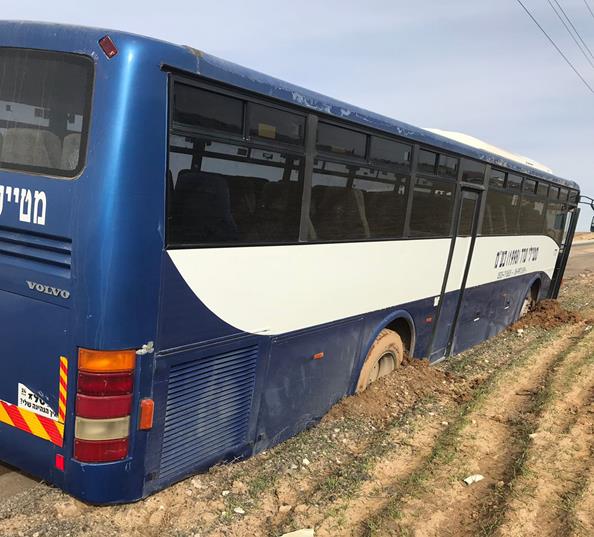Adalah to Israeli authorities: Repair often impassable school access road in Bedouin village
Adalah – The Legal Center for Arab Minority Rights in Israel has sent a letter to Israeli authorities demanding that they repair an often impassable access road that leads to schools in the Bedouin village of Al-Fur’a in the country’s southern Naqab (Negev) desert region.

A school bus stuck in the mud on the Al-Fur’a school access road.
In its letter sent on 24 January 2018 to the Israeli Education Ministry, the Al Qasoum Regional Council, the national transport infrastructure company Netivei Israel, and the Bedouin Negev Development and Settlement Authority, Adalah demanded that they repair the school access road and connect it to Highway 31.
Al-Fur’a – recognized by the state in 2006 – is home to some 6,000 residents. Around 3,000 children from Al-Fur’a and neighboring Bedouin communities attend kindergarten, elementary school, middle school, and high school in the village.
In response to a petition filed by Adalah and Al-Fur’a residents in 2005, the state committed to repairing the access road and made a subsequent such commitment when faced with a contempt of court claim filed by residents in the Supreme Court.
Nevertheless, the schools today remain connected to Highway 31 only via a cracked and often impassable 600-meter long “agricultural track” that is riddled with potholes.
Adalah Attorney Myssana Morany wrote in her letter that the state has been violating its commitments to the court for years:
“Connecting [the schools] to the highway interchange via an agricultural track does not satisfy the state’s commitments made before the Supreme Court, which has already ruled that ‘agricultural tracks are not to be considered ‘statutory roads’, and are therefore not considered roads at all… Village residents are reporting difficulties for vehicles – particularly school buses – when winter conditions create potholes in the track making it inaccessible. The track is also too narrow for two vehicles traveling in opposite directions to drive down at the same time. Further, during days of heavy rain, the track becomes entirely submerged and completely impassable.”
Adalah also stressed that the agricultural track presents a danger to local schoolchildren:
“The current situation threatens students’ lives and violates their constitutional rights to dignity and equality, as well as their right to education, as enshrined in the Compulsory Education Law. It is clear to all that an agricultural track is not a safe way to get students to school and that an asphalt access road must be paved in accordance with the relevant standards.”















